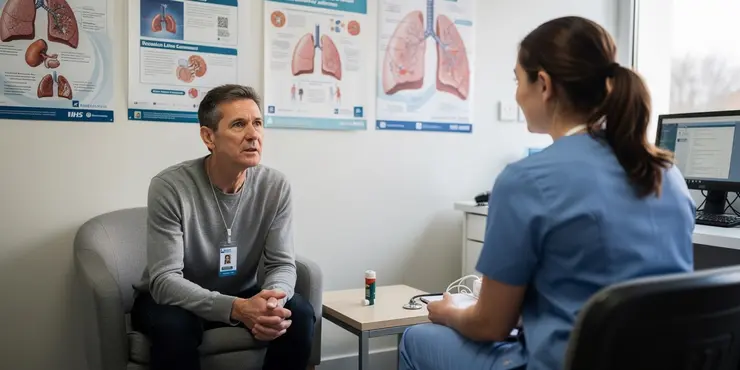
Find Help
More Items From Ergsy search
-

Are inhalers the only treatment for asthma?
Relevance: 100%
-

How is asthma treated?
Relevance: 60%
-

What is Asthma?
Relevance: 59%
-

Can asthma be cured?
Relevance: 56%
-

Is asthma a serious condition?
Relevance: 54%
-

Can asthma be fatal?
Relevance: 54%
-

Are there different types of asthma?
Relevance: 51%
-

An Asthma Explainer with Dr Katherine Hickman
Relevance: 51%
-

How is asthma diagnosed?
Relevance: 50%
-

Is there a link between hay fever and asthma?
Relevance: 47%
-

What is an asthma action plan?
Relevance: 46%
-

How can asthma attacks be prevented?
Relevance: 44%
-

How often should someone with asthma see a doctor?
Relevance: 43%
-

Can dust mites cause asthma and eczema?
Relevance: 42%
-

What are the common symptoms of asthma?
Relevance: 41%
-

Can exercise trigger asthma symptoms?
Relevance: 40%
-

What causes asthma?
Relevance: 39%
-

Can children outgrow asthma?
Relevance: 38%
-

Can diet affect asthma?
Relevance: 38%
-

What triggers asthma attacks?
Relevance: 36%
-

What are some common pollutants that affect asthma sufferers in urban areas?
Relevance: 36%
-

Is asthma more common in certain age groups?
Relevance: 35%
-

Can stress cause asthma symptoms?
Relevance: 35%
-

Rise in Childhood Asthma Linked to Air Pollution in Urban Areas
Relevance: 35%
-

How does air pollution affect asthma?
Relevance: 34%
-

How to retrain your breathing | Part 2 | Asthma, long covid or breathlessness
Relevance: 34%
-

Are there mobile apps to track air quality and its impact on asthma?
Relevance: 31%
-

Where can I find information on air pollution and its effect on Asthma for my local area?
Relevance: 30%
-

UK Study Links Poor Air Quality to Increased Asthma Cases in Urban Areas
Relevance: 30%
-

Where can I find research studies on air pollution and asthma in my area?
Relevance: 29%
-

How can I reduce my exposure to air pollution if I have asthma?
Relevance: 27%
-

Is sedation available during NHS dental treatments?
Relevance: 24%
-

What local organizations provide information on air pollution and asthma?
Relevance: 22%
-

What local organizations provide information on air pollution and asthma?
Relevance: 22%
-

Chest infection: what should I do?
Relevance: 22%
-

Where can I find general information about air pollution and asthma?
Relevance: 21%
-

What treatments are available for Super Flu?
Relevance: 21%
-

Is epinephrine the only treatment for severe nut allergy reactions?
Relevance: 20%
-

Having chemotherapy and other treatments in the Day Treatment Unit
Relevance: 19%
-
Is there a treatment for measles?
Relevance: 19%
Understanding Asthma Treatment
Asthma is a chronic respiratory condition affecting millions worldwide, including many in the UK. While inhalers are a well-known treatment option, they are not the only means of managing this condition. Understanding the range of treatment options available can help individuals and caregivers make informed decisions about their asthma management.
The Role of Inhalers in Asthma Management
Inhalers are a primary treatment for asthma and work by delivering medication directly to the lungs. There are two main types: preventer inhalers, which contain steroids to reduce inflammation and prevent symptoms, and reliever inhalers, which provide quick relief from acute symptoms. These medications help control asthma in the majority of patients, allowing them to lead normal, active lives.
Beyond Inhalers: Additional Asthma Treatments
While inhalers are effective, some individuals may require additional treatments. Tablets, such as leukotriene receptor antagonists, offer an alternative for those who struggle with inhalers or need extra symptom control. Oral steroids are another option, typically reserved for severe cases due to potential side effects.
Biologic Treatments
For individuals with severe asthma that doesn't respond well to conventional treatments, biologic therapies offer hope. These are injectable medications that target specific pathways in the body's immune system to prevent inflammation. Examples include omalizumab and mepolizumab, which have shown to be beneficial for certain types of severe asthma.
Lifestyle Modifications and Asthma Management
Managing asthma effectively often requires lifestyle adjustments. Identifying and avoiding triggers is crucial. Common triggers in the UK include pollen, air pollution, and household allergens. Regular exercise, maintaining a healthy weight, and smoking cessation are all recommended to improve asthma control. Additionally, asthma education programs can empower patients to manage their condition effectively.
Complementary and Alternative Medicines
Some people explore complementary therapies such as acupuncture, yoga, or herbal remedies. However, the efficacy and safety of these treatments are less established, and they should be used alongside, not in place of, conventional medical treatments. It's essential to consult with a healthcare provider before trying alternative therapies.
Conclusion
While inhalers remain the cornerstone of asthma treatment, they are not the only option. Various medications, advanced biologic treatments, and lifestyle modifications provide a comprehensive approach to asthma management. Patients should work closely with their healthcare providers to tailor treatment plans to their specific needs, ensuring optimal control of their condition.
Understanding Asthma Treatment
Asthma is a condition that makes it hard to breathe. Many people around the world, including lots in the UK, have asthma. Inhalers are one way to treat asthma, but there are other ways too. Knowing all the different treatments can help people and their carers make good choices about how to handle asthma.
The Role of Inhalers in Asthma Management
Inhalers are a common treatment for asthma. They help by getting medicine straight to the lungs. There are two main kinds of inhalers: preventer inhalers and reliever inhalers. Preventer inhalers help stop asthma symptoms before they start. Reliever inhalers give quick help when symptoms suddenly appear. These medicines help many people with asthma live normal and active lives.
Beyond Inhalers: Additional Asthma Treatments
While inhalers work well for many, some people need more help. Tablets might be used if inhalers aren't enough. One type of tablet is called leukotriene receptor antagonists. For really bad asthma, doctors might give oral steroids, but they can have side effects.
Biologic Treatments
For people with very severe asthma that doesn't get better with regular treatments, there are special medicines called biologics. These are injections that help stop swelling by working with the body's immune system. Examples include medicines like omalizumab and mepolizumab. They are helpful for some types of severe asthma.
Lifestyle Modifications and Asthma Management
To manage asthma well, people might need to change some daily habits. It's important to find and avoid things that make asthma worse, like pollen, air pollution, and dust. Exercising regularly, staying at a healthy weight, and not smoking can also help control asthma. Also, learning more about asthma in special programs can help people manage it better.
Complementary and Alternative Medicines
Some people try other treatments like acupuncture, yoga, or herbs. But these are not proven to be as safe or effective as medical treatments. They should only be used with regular medicine, not instead of it. It's important to talk to a doctor before trying these other treatments.
Conclusion
Inhalers are an important part of treating asthma, but there are other options too. Different medicines, new biologic treatments, and changes in lifestyle all help deal with asthma. People should talk closely with their doctors to find the best treatment that suits their personal needs, helping them keep their asthma under control.
Frequently Asked Questions
Are inhalers the only treatment for asthma?
No, inhalers are not the only treatment for asthma. There are other treatment options such as oral medications, biologics, and lifestyle modifications.
What types of inhalers are used for asthma treatment?
The two main types of inhalers used for asthma treatment are rescue inhalers (usually containing a medication like albuterol) and maintenance inhalers (containing corticosteroids or long-acting bronchodilators).
What are oral medications for asthma?
Oral medications for asthma include leukotriene modifiers, theophylline, and oral corticosteroids, which help control inflammation and prevent asthma attacks.
Can biologics be used to treat asthma?
Yes, biologics are a type of medication that can be used in severe asthma cases. They target specific pathways in the immune system involved in asthma.
What role do lifestyle changes play in asthma management?
Lifestyle changes, such as avoiding triggers, maintaining a healthy weight, quitting smoking, and exercising regularly, can help manage asthma symptoms.
Is allergy treatment part of asthma management?
Yes, since allergies can trigger asthma, treating allergies with antihistamines or immunotherapy can help manage asthma symptoms.
Can breathing exercises help with asthma?
Yes, breathing exercises like the Buteyko method and diaphragmatic breathing can improve breathing efficiency and reduce asthma symptoms.
What is the role of immunotherapy in asthma treatment?
Immunotherapy, such as allergy shots, can help desensitize the immune system to allergens and reduce asthma symptoms related to allergies.
What is an asthma action plan?
An asthma action plan is a personalized plan developed with your healthcare provider that outlines how to manage your asthma daily and during an attack.
Can dietary changes improve asthma symptoms?
While no specific diet cures asthma, a diet rich in fruits, vegetables, and omega-3 fatty acids can support overall respiratory health.
What are corticosteroids and how do they help asthma?
Corticosteroids reduce inflammation in the airways, improving asthma symptoms and preventing flare-ups.
Are there any alternative or complementary therapies for asthma?
Some people try alternative therapies like acupuncture, herbal remedies, or yoga for asthma, but these should supplement, not replace, conventional treatment.
What is theophylline and how does it work for asthma?
Theophylline is an oral medication that helps open the airways by relaxing muscles in the lungs, making breathing easier.
How do leukotriene modifiers work in asthma treatment?
Leukotriene modifiers block chemicals involved in the inflammatory response, reducing swelling and mucus in the airways.
Can humidifiers help with asthma?
Humidifiers can help maintain moisture in the air, but they must be clean to avoid mold or dust mites, which can trigger asthma.
Are there surgical treatments for asthma?
Bronchial thermoplasty is a surgical procedure that can reduce muscle mass in the airways, helping severe asthma cases.
What is bronchial thermoplasty?
Bronchial thermoplasty is a procedure that applies heat to the airway walls to reduce muscle thickness, helping to decrease severe asthma symptoms.
What types of biologics are used for asthma?
Biologics such as omalizumab, mepolizumab, and dupilumab are used for asthma by targeting specific inflammatory pathways involved in asthma.
Can exercise improve asthma symptoms?
Regular exercise can improve lung function and respiratory muscle strength, but people with asthma should work with their healthcare provider to create a safe exercise plan.
Is it important to monitor asthma regularly?
Yes, regular monitoring with a peak flow meter and communication with a healthcare provider is crucial to manage asthma effectively.
Can you use only inhalers to treat asthma?
If you have asthma, you might use an inhaler. But are there other ways to help with asthma?
Inhalers help you breathe better. They are often the first choice to treat asthma.
Besides inhalers, there are other things that can help:
- Medicine: Sometimes, people take medicine with or instead of an inhaler.
- Healthy Habits: Eating healthy food, doing exercise, and getting good rest can help, too.
- Avoid Triggers: Stay away from things like smoke, dust, or pets that can make asthma worse.
It's important to talk to a doctor about the best way to take care of your asthma.
Use tools like pictures and videos to learn more about asthma. Talking with someone you trust can also help you understand.
No, inhalers are not the only way to treat asthma. There are other ways to help, like taking pills, special medicine from a doctor, and changing how you live.
What kinds of puffers help with asthma?
People with asthma use puffers to help them breathe better. Here are the main kinds:
- Reliever Puffers: These help you feel better fast if you have trouble breathing.
- Preventer Puffers: You use these every day to stop breathing problems before they start.
- Combination Puffers: These have medicine from relievers and preventers. They do both jobs.
If reading is hard, here are some tips:
- Ask someone to read with you.
- Use pictures to help understand the words.
- Try listening to audio books.
There are two main kinds of inhalers for treating asthma:
1. Rescue Inhalers: These inhalers help when you have trouble breathing suddenly. They often have medicine called albuterol.
2. Maintenance Inhalers: These inhalers help keep your lungs healthy over time. They have medicine like corticosteroids or long-acting bronchodilators.
If it’s hard to remember these details, using pictures or labels might help. Talking to a nurse or doctor can also be useful.
What are asthma pills?
Asthma pills help people breathe better when they have asthma. They work by calming the lungs.
Here are some tips to help understand asthma pills:
- Ask your doctor what the pills are for.
- Use pictures or videos to learn more about asthma.
- Find a support group to talk to others with asthma.
There are some pills you can take for asthma. These pills are:
- Leukotriene modifiers
- Theophylline
- Oral corticosteroids
These pills help stop swelling and keep asthma attacks away.
Can biologics help with asthma?
Biologics are special medicines. They can help people who have asthma.
If you have asthma, you can talk to a doctor. They will tell you if biologics are good for you.
Using pictures or videos can help you understand better. You can also ask someone you trust to explain it to you.
Yes, some special medicines called biologics can help if you have bad asthma. They work with your body's immune system to help with asthma.
How can changing your lifestyle help with asthma?
To help with asthma, you can try doing these things:
- Stay away from things that make your asthma worse.
- Keep a healthy weight.
- Stop smoking if you smoke.
- Exercise often.
These changes can help you feel better with asthma.
Is treating allergies part of taking care of asthma?
If you have asthma, you might also have allergies. Treating allergies can help with asthma. Ask a doctor what to do.
Tips to help:
- Ask a grown-up to help you at doctor visits.
- Use pictures to understand better.
- Keep notes to remember important things.
Yes, allergies can make asthma worse. Taking allergy medicine or getting special treatments can help control asthma symptoms.
Can breathing exercises help with asthma?
Asthma makes it hard to breathe. Breathing exercises can help make breathing easier.
Here are some tips:
- Breathe in through your nose.
- Breathe out slowly through your mouth.
- Practice every day.
Remember, talk to a doctor if you feel unwell.
Yes, breathing exercises can help you breathe better and feel less wheezy if you have asthma. Try the Buteyko method and breathing with your belly.
How does immunotherapy help with asthma?
Immunotherapy is a treatment that can help people with asthma. It works by making your body get used to the things that make your asthma worse, like dust or pollen. This can help you have fewer asthma attacks.
If you have asthma, talk to your doctor. They can tell you if immunotherapy might be good for you.
To better understand, you can:
- Use pictures or videos to learn more about asthma and immunotherapy.
- Ask someone you trust to read this with you.
- Write down any questions you have for your doctor.
Allergy shots are a type of medicine that can help people with asthma feel better. They work by teaching the body to not react so strongly to things that cause allergies.
What is an asthma action plan?
An asthma action plan is a simple plan to help you when you have asthma. It tells you what to do when you feel good and when you need help. The plan helps you stay safe and breathe easy.
Here are some supportive tools that can help:
- Asthma Inhaler: An inhaler helps you breathe better when you have asthma symptoms.
- Doctor's Advice: Your doctor can help you make a plan and give you advice on what to do.
- Color Codes: Your plan might use colors like green, yellow, and red to show how you are feeling.
Remember, the plan is to keep you safe and make sure you get the help you need.
An asthma action plan is a special plan made just for you with your doctor. It helps you know what to do every day to take care of your asthma. It also tells you what to do if you have an asthma attack.
Can food changes help asthma?
There is no special food that can stop asthma. But eating lots of fruits, vegetables, and healthy fats like omega-3 can help you breathe better.
What are corticosteroids and how do they help with asthma?
Corticosteroids are special medicines that help your body feel better.
If you have asthma, these medicines can help you breathe easier.
Corticosteroids reduce swelling in your airways, making it easier to get air in and out of your lungs.
Some people use inhalers to take these medicines.
Inhalers are tools that help you breathe in the medicine quickly.
If you have asthma, talk to a doctor. They can help you with the best way to use the medicine.
Corticosteroids help make the airways less swollen. This makes breathing easier for people with asthma. They also stop asthma from getting worse.
If you have trouble reading, try using a text-to-speech tool. It reads the words out loud for you. You can also ask someone to read with you and explain if you need help.
Are there other ways to help with asthma?
Here are some simple things you can try to help with asthma:
- Breathing exercises: Practice taking slow, deep breaths.
- Yoga: Gentle stretches and breathing can help you feel better.
- Herbs or supplements: Talk to a doctor first before trying these.
- Relaxation: Listen to calming music or do something that helps you relax.
Remember to always talk to a doctor before trying new things for asthma.
Some people try other kinds of help like special needles called acupuncture, using plants for medicine, or doing exercises like yoga to feel better with asthma. But it's important to keep using regular medicine from the doctor too.
What is theophylline and how does it help with asthma?
Theophylline is a kind of medicine. It helps people with asthma.
Asthma can make it hard to breathe. Theophylline helps by relaxing the muscles in your lungs. This helps you breathe easier.
If you have trouble reading, you can ask someone to read with you. You can also use apps that read text out loud.
Theophylline is a medicine you take by mouth. It helps you breathe better. It works by relaxing the muscles in your lungs.
How do leukotriene modifiers help people with asthma?
Leukotriene modifiers are medicines. They help people who have asthma. Asthma can make it hard to breathe.
Leukotriene modifiers work by stopping certain chemicals in your body. These chemicals can make asthma worse. The medicine helps your lungs work better.
Here are some tools to help understand:
- Pictures showing how lungs work
- Short videos for kids about asthma
- Asking a doctor or nurse to explain in simple words
Leukotriene modifiers are medicine. They help your body when it is inflamed. This means they stop swelling and too much mucus in your nose and throat.
Can humidifiers help with asthma?
Do you have asthma? Breathing can be hard sometimes, right?
A humidifier can put water in the air. This can help you breathe better. But be careful! Too much water can make asthma worse.
Ask a doctor for advice. They can help you choose the right humidifier.
Tools to help you:
- Use pictures or videos to see how humidifiers work.
- Ask a friend or family member to help you read the instructions.
Humidifiers add water to the air. This helps keep the air not too dry. But, it is important to keep them clean. If they are dirty, they can have mold or dust mites. These can make asthma worse.
Can you have surgery for asthma?
Doctors do not usually use surgery to treat asthma. They use medicine and breathing exercises to help people with asthma.
People with asthma can use special tools like inhalers to breathe better.
Bronchial thermoplasty is a surgery. It helps people with bad asthma breathe better. It does this by making the muscles in the airways smaller.
What is bronchial thermoplasty?
Bronchial thermoplasty is a treatment for asthma. It helps people breathe better. A doctor uses heat to make the airways in the lungs bigger. This helps air move in and out more easily.
If you find reading hard, you can use tools to help you. Try listening to audiobooks or asking someone to read with you.
Bronchial thermoplasty is a treatment. It uses heat on the airway walls to make the muscles thinner. This helps reduce bad asthma symptoms.
What medicines help with asthma?
Some special medicines can help with asthma. These medicines have long names like omalizumab, mepolizumab, and dupilumab. They work by calming down the parts of the body that make asthma worse.
Can exercise make asthma better?
Exercise is moving your body, like running or playing. Some doctors say exercise can help people with asthma breathe better. But, if you have asthma, it’s important to be careful.
If you want to try exercising:
- Talk to a doctor first. They can tell you what is safe.
- Start slow, like a short walk.
- Use your inhaler if your doctor says to.
- Take breaks and drink water.
- Try fun activities, like playing catch or riding a bike.
Tools like apps or videos can help you learn exercises that are safe.
Exercise can help make your lungs and breathing muscles stronger. But if you have asthma, you should talk to your doctor to make a safe exercise plan.
Why should you check asthma often?
Yes, it is very important to check your breathing with a peak flow meter and talk to your doctor. This helps to keep asthma under control.
Useful Links
This website offers general information and is not a substitute for professional advice.
Always seek guidance from qualified professionals.
If you have any medical concerns or need urgent help, contact a healthcare professional or emergency services immediately.
Some of this content was generated with AI assistance. We’ve done our best to keep it accurate, helpful, and human-friendly.
- Ergsy carfully checks the information in the videos we provide here.
- Videos shown by Youtube after a video has completed, have NOT been reviewed by ERGSY.
- To view, click the arrow in centre of video.
- Most of the videos you find here will have subtitles and/or closed captions available.
- You may need to turn these on, and choose your preferred language.
- Go to the video you'd like to watch.
- If closed captions (CC) are available, settings will be visible on the bottom right of the video player.
- To turn on Captions, click settings .
- To turn off Captions, click settings again.
More Items From Ergsy search
-

Are inhalers the only treatment for asthma?
Relevance: 100%
-

How is asthma treated?
Relevance: 60%
-

What is Asthma?
Relevance: 59%
-

Can asthma be cured?
Relevance: 56%
-

Is asthma a serious condition?
Relevance: 54%
-

Can asthma be fatal?
Relevance: 54%
-

Are there different types of asthma?
Relevance: 51%
-

An Asthma Explainer with Dr Katherine Hickman
Relevance: 51%
-

How is asthma diagnosed?
Relevance: 50%
-

Is there a link between hay fever and asthma?
Relevance: 47%
-

What is an asthma action plan?
Relevance: 46%
-

How can asthma attacks be prevented?
Relevance: 44%
-

How often should someone with asthma see a doctor?
Relevance: 43%
-

Can dust mites cause asthma and eczema?
Relevance: 42%
-

What are the common symptoms of asthma?
Relevance: 41%
-

Can exercise trigger asthma symptoms?
Relevance: 40%
-

What causes asthma?
Relevance: 39%
-

Can children outgrow asthma?
Relevance: 38%
-

Can diet affect asthma?
Relevance: 38%
-

What triggers asthma attacks?
Relevance: 36%
-

What are some common pollutants that affect asthma sufferers in urban areas?
Relevance: 36%
-

Is asthma more common in certain age groups?
Relevance: 35%
-

Can stress cause asthma symptoms?
Relevance: 35%
-

Rise in Childhood Asthma Linked to Air Pollution in Urban Areas
Relevance: 35%
-

How does air pollution affect asthma?
Relevance: 34%
-

How to retrain your breathing | Part 2 | Asthma, long covid or breathlessness
Relevance: 34%
-

Are there mobile apps to track air quality and its impact on asthma?
Relevance: 31%
-

Where can I find information on air pollution and its effect on Asthma for my local area?
Relevance: 30%
-

UK Study Links Poor Air Quality to Increased Asthma Cases in Urban Areas
Relevance: 30%
-

Where can I find research studies on air pollution and asthma in my area?
Relevance: 29%
-

How can I reduce my exposure to air pollution if I have asthma?
Relevance: 27%
-

Is sedation available during NHS dental treatments?
Relevance: 24%
-

What local organizations provide information on air pollution and asthma?
Relevance: 22%
-

What local organizations provide information on air pollution and asthma?
Relevance: 22%
-

Chest infection: what should I do?
Relevance: 22%
-

Where can I find general information about air pollution and asthma?
Relevance: 21%
-

What treatments are available for Super Flu?
Relevance: 21%
-

Is epinephrine the only treatment for severe nut allergy reactions?
Relevance: 20%
-

Having chemotherapy and other treatments in the Day Treatment Unit
Relevance: 19%
-
Is there a treatment for measles?
Relevance: 19%


